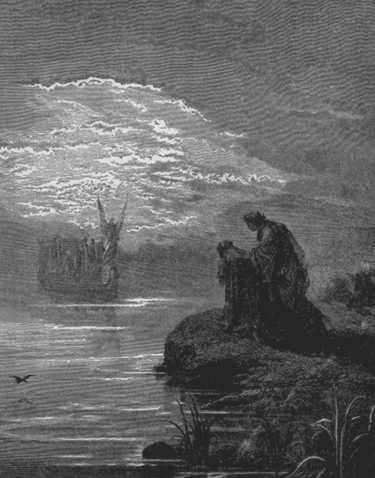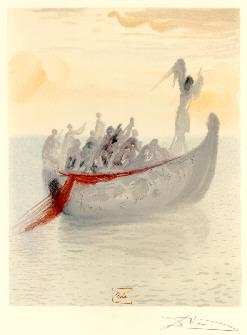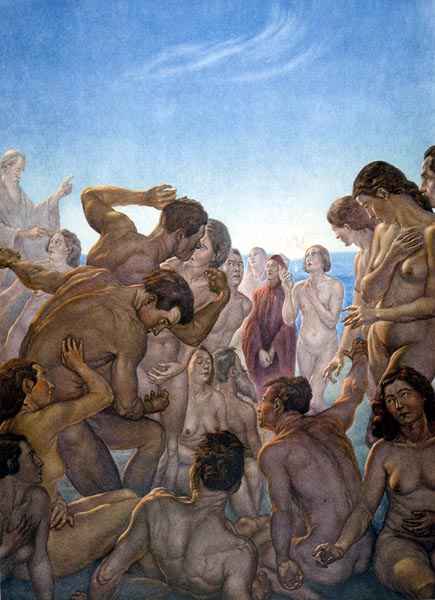 |
 |
 |
|
|
|
|
 |
 |
 |
|
|
|
|
| PURG02 |
|
|
|
|
| ........... | ....... G.GUAITA |
................................. H.W.LONGFELLOW |
...... .D.ALIGHIERI |
....... ... | ....... |
| 1
|
Già
l'éra
'
l
sul
a l'urizònt dal piàn che l'è taià par drit dal meridiàn che al zenìt pàsa giüst 'd Gerüzalèm; |
Already
had the sun the horizon reached Whose circle of meridian covers o'er Jerusalem with its most lofty point, And night that
opposite to
him revolves So that the white
and the
vermilion cheeks |
Già
era
'l
sole
a l'orizzonte giunto lo cui meridian cerchio coverchia Ierusalèm col suo più alto punto; |
| 4
|
e
la
Nöt,
che
la
gìra dl'àuta part, surtìva ad Gànge tnénd i dùi balànsi che quànd 's fa lònga zguìju a lé da 'n man; |
e la
notte, che opposita
a lui cerchia, uscia di Gange fuor con le Bilance, che le caggion di man quando soverchia; |
|
| 7
|
e
'l
culùr
biànc
e
rus dla carnagiòn, la 'ndùa mi 'm truvàva, dla bèla Auròra, pasànd al témp as fàva giàld durà. |
sì
che le
bianche e le vermiglie guance, là dov'i' era, de la bella Aurora per troppa etate divenivan rance. |
|
| 10
|
Nùi
iéru
'ncu
nén
tant
da mar luntàn mè cùi che i pénsu a 'ndùa i dévu andè, e i viàgiu cun la mént, ma fèrm ia stan. |
We
still were on the border of the sea, Like people who are thinking of their road, Who go in heart and with the body stay; And lo! as when,
upon the
approach of morning, Appeared to
me--may I again
behold it!-- |
Noi
eravam lunghesso
mare ancora, come gente che pensa a suo cammino, che va col cuore e col corpo dimora. |
| 13
|
E
mè
che
rus,
as
vëd, 'd prìma matìn'a, par i vapùr a spës Màrte 'l cumpàr ansla piàn'a dal mar là vèrs punént, , |
Ed ecco,
qual, sorpreso
dal mattino, per li grossi vapor Marte rosseggia giù nel ponente sovra 'l suol marino |
|
| 16
|
cuzì
iù
vist,
pudéisa
vëdlu
ancùra, ansal mar, an ciar velucement rivè, mè niénte iàva vist cuzì vulè. |
cotal
m'apparve,
s'io ancor lo veggia, un lume per lo mar venir sì ratto, che 'l muover suo nessun volar pareggia. |
|
| 19
|
Pö
d'ògni
part
ad
cul,
i cumparìva quaicòs ad culùr biànc e ànche da sùta, n àut biànc sa vdìva sòrti püsè ciàr. |
From
which when I a little had withdrawn Mine eyes, that I might question my Conductor, Again I saw it brighter grown and larger. Then on each side
of it appeared
to me My Master yet had
uttered
not a word |
Dal qual
com'io un
poco ebbi ritratto l'occhio per domandar lo duca mio, rividil più lucente e maggior fatto. |
| 22
|
E
dop
che
ciamànd
cünt
al mè maèstru a iàva nén vardà par an mumént, lu vëd già fat pü grand e pü lüzént. |
Poi
d'ogne lato ad
esso m'appario un non sapeva che bianco, e di sotto a poco a poco un altro a lui uscio. |
|
| 25
|
'L
mè
maèstru
l'ha
tazì
fin quànd ch'i éru àli cul biànc, l'ha nén s'ciarà; ma quànd a pilutè l'ha vist chi l'éra: |
Lo mio
maestro ancor
non facea motto, mentre che i primi bianchi apparver ali; allor che ben conobbe il galeotto, |
|
| 28
|
"
A
tèra
-
'm
dis - e bütti anginuià; vàrda l'àngial dal cél, sta cùi man giònti; urmài chi tnu vidrè di si minìstr. |
He
cried: "Make haste, make haste to bow the knee! Behold the Angel of God! fold thou thy hands! Henceforward shalt thou see such officers! See how he
scorneth human
arguments, See how he holds
them pointed
up to heaven, |
gridò: «Fa,
fa che le ginocchia cali. Ecco l'angel di Dio: piega le mani; omai vedrai di sì fatti officiali. |
| 31
|
'T
vëdi,
da
bzògn
ià
nén di arnéis ümàn; lü nén ià 'l rëm e nànca 'l völ la véla; mèche i so àli e 'l vén da tant luntàn! |
Vedi che
sdegna li
argomenti umani, sì che remo non vuol, né altro velo che l'ali sue, tra liti sì lontani. |
|
| 34
|
Vàrda
mè
iu
tén
drìti
anvèrs al cél, e 'l dròva cùli piümi imperitüri che i càscu nén mè i péi di creatüri." |
Vedi come
l'ha dritte
verso 'l cielo, trattando l'aere con l'etterne penne, che non si mutan come mortal pelo». |
|
| 37
|
Pö
man
a
man
che
's avzinàva a rìva 'l divìn üzèl sémp püsè ciàr la vnìva tant che fisè cun i öc' 's pudìva nén, |
Then
as still nearer and more near us came The Bird Divine, more radiant he appeared, So that near by the eye could not endure him, But down I cast
it; and he
came to shore Upon the stern
stood the
Celestial Pilot; |
Poi, come
più
e più verso noi venne l'uccel divino, più chiaro appariva: per che l'occhio da presso nol sostenne, |
| 40
|
e
iù
zbasài;
e
cul
a rìva 'l vén cun na barchëta sütila e ligéra, che l'àqua pròpi lu tucàva nén. |
ma
chinail giuso;
e quei sen venne a riva con un vasello snelletto e leggero, tanto che l'acqua nulla ne 'nghiottiva. |
|
| 43
|
'L
pilòta
celestiàl
l'éra
dadré e zmiàva 'n fàcia l'éisa scrit beàto; pü 'd sént a spìrit iéru 'ndrén satà. |
Da poppa
stava il
celestial nocchiero, tal che faria beato pur descripto; e più di cento spirti entro sediero. |
|
| 46
|
"In
exitu
Israel
de
Aegypto", cantàvu tüti 'nsèma a na vus sùla, e 'l rèst che 'nti cul salm a 's tròva scrit. |
"In
exitu Israel de Aegypto!" They chanted all together in one voice, With whatso in that psalm is after written. Then made he sign
of holy
rood upon them, The throng which
still remained
there unfamiliar |
'In
exitu Israel
de Aegypto' cantavan tutti insieme ad una voce con quanto di quel salmo è poscia scripto. |
| 49
|
Pö
dzùra
a
lur
l'ha
fàji al sëgn ad crus e dop che 'n spiàgia fòra ién surtì, mè prìma, cul velòce l'è partì. |
Poi fece
il segno
lor di santa croce; ond'ei si gittar tutti in su la piaggia; ed el sen gì, come venne, veloce. |
|
| 52
|
Rivà
la
gént
nén
pràtica
dal post, l'éra lì che 's vardàva tant stüpìa mè iün che cunusénsa növa 'l pìa. |
La turba
che rimase
lì, selvaggia parea del loco, rimirando intorno come colui che nove cose assaggia. |
|
| 55
|
An
tüti
'l
part
al
sul l'éra rivà e cun i rag' putént al Capricòrnu, già vìa da 'n mès dal cél l'àva pusà, |
On
every side was darting forth the day. The sun, who had with his resplendent shafts From the mid-heaven chased forth the Capricorn, When the new
people lifted
up their faces And answer made
Virgilius:
"Ye believe |
Da tutte
parti saettava
il giorno lo sol, ch'avea con le saette conte di mezzo 'l ciel cacciato Capricorno, |
| 58
|
quànd
la
gént
növa
a
nùi drìsa la front par ciamèni cuzì: " Se vùi lu séi, la vìa mustrèni da rivè al mont". |
quando la
nova gente
alzò la fronte ver' noi, dicendo a noi: «Se voi sapete, mostratene la via di gire al monte». |
|
| 61
|
"Vui
fòrse
i
crëdi
-
a lur rispònd Virgìlio - che nùi i sìu pràtic di si post; ma tam mè vù sùma furastè, |
E
Virgilio rispuose:
«Voi credete forse che siamo esperti d'esto loco; ma noi siam peregrin come voi siete. |
|
| 64
|
adès
rivà,
nén
tant
prìma
che vùi, par an camìn che l'éra cuzì dür, che urmài al muntè sü na zmiirà 'n giöc". |
Just
now we came, a little while before you, Another way, which was so rough and steep, That mounting will henceforth seem sport to us." The souls who
had, from seeing
me draw breath, And as to
messenger who bears
the olive |
Dianzi
venimmo, innanzi
a voi un poco, per altra via, che fu sì aspra e forte, che lo salire omai ne parrà gioco». |
| 67
|
Cùli
ànimi,
quànd
ién
'ncurgìsni
'd mi che i respiràva e iéra ancùra viv, dla maravìja ién fàsi tüti zmòrti. |
L'anime,
che si fuor
di me accorte, per lo spirare, ch'i' era ancor vivo, maravigliando diventaro smorte. |
|
| 70
|
E
tam
mè
a
cul
che 'l pòrta 'l ram d'ulìva ai cur la gént par sénti i so nutìsji, e 's pùsu e stan adòs pr' andèi rìva, |
E come a
messagger
che porta ulivo tragge la gente per udir novelle, e di calcar nessun si mostra schivo, |
|
| 73
|
cuzì
a
la
mè
fàcia
vardànd fis, i ànimi furtünà as dizmantiàvu da piè la vìa ca pòrta 'n Paradìs. |
So
at the sight of me stood motionless Those fortunate spirits, all of them, as if Oblivious to go and make them fair. One from among
them saw I
coming forward, O empty shadows,
save in
aspect only! |
così al
viso mio
s'affisar quelle anime fortunate tutte quante, quasi obliando d'ire a farsi belle. |
| 76
|
Pö
i
vëd
che
iün
ad lur as fa avànti zlargànd i bras e cun tànta afesiòn, che ànche a mi l'è vnìmi 'd fè autartànt. |
Io vidi
una di lor
trarresi avante per abbracciarmi con sì grande affetto, che mosse me a far lo somigliante. |
|
| 79
|
Ohi
òmbri,
che
i
séi
mèc antl' aparénsa! Trè vòlti daré 'd lü iù stranzì i bras, e iù 'rtirài sénsa niénte 'ndrénta! |
Ohi ombre
vane, fuor
che ne l'aspetto! tre volte dietro a lei le mani avvinsi, e tante mi tornai con esse al petto. |
|
| 82
|
Ansla
mè
fàcia
as
lég'
la maravìa; l'òmbra surìd e 's tìra 'n poc andré, e mi après a lü am fas avànti. |
I
think with wonder I depicted me; Whereat the shadow smiled and backward drew; And I, pursuing it, pressed farther forward. Gently it said
that I should
stay my steps; It made reply to
me: "Even
as I loved thee |
Di
maraviglia, credo,
mi dipinsi; per che l'ombra sorrise e si ritrasse, e io, seguendo lei, oltre mi pinsi. |
| 85
|
Cun
bel
döit
am
fa
sëgn che mi 'm paziéisa; alùra i cunòs chi l'éra e lu prég che par parlè cun mi 'n poc as farméisa. |
Soavemente disse
ch'io posasse; allor conobbi chi era, e pregai che, per parlarmi, un poco s'arrestasse. |
|
| 88
|
'M
rispònd
:"
Mè
iù
vulìti bén da viv quànd t'àvi 'l corp, cuzì 'nche dès 't völ bén; par cust mi 'm fèrm; ma ti 'ndùa l'è ca 't vè?". |
Rispuosemi: «Così
com'io t'amai nel mortal corpo, così t'amo sciolta: però m'arresto; ma tu perché vai?». |
|
| 91
|
"Casèlla
car,
par
turnè
n'
àuta vòlta chi 'ndùa i son , mi iù bütàmi 'n viàgi ; - iù dii -ma parchè 't rivi 'n ritàrd?". |
"My
own Casella! to return once more There where I am, I make this journey," said I; "But how from thee has so much time be taken?" And he to me: "No
outrage
has been done me, For of a
righteous will his
own is made. |
«Casella
mio, per
tornar altra volta là dov'io son, fo io questo viaggio», diss'io; «ma a te com'è tanta ora tolta?». |
| 94
|
E
lü
:"
L'è
nén
chi sòfra ròbi ingiüsti, se cul che 'l pìa quànd e chi lü 'l völ, a l'ha nén dàmi prìma ad fè 's pasàgi; |
Ed elli a
me: «Nessun
m'è fatto oltraggio, se quei che leva quando e cui li piace, più volte m'ha negato esto passaggio; |
|
| 97
|
lònche
lü
'l
völ
a
l'è cunfùrm al giüst; ma da trè méis, anvéce, lü l'ha pià chi ca 'l vulìva entrè an sànta pas. |
ché di
giusto voler
lo suo si face: veramente da tre mesi elli ha tolto chi ha voluto intrar, con tutta pace. |
|
| 100
|
E
mi
che
ia
spitàva
avzin'a 'l mar 'ndùa al Tévere l'àqua 's fa salà, da lü cumudamént iù stàta pià. |
Whence
I, who now had turned unto that shore Where salt the waters of the Tiber grow, Benignantly by him have been received. Unto that outlet
now his
wing is pointed, And I: "If some
new law take
not from thee |
Ond'io,
ch'era ora
a la marina vòlto dove l'acqua di Tevero s'insala, benignamente fu' da lui ricolto. |
| 103
|
Vèrs
cùla
part
lü
dès
l'ha drisà 'l vol parchè a cul port 's radün'a sémp la gént nén destinà an rìva dl'Acherònt. |
A quella
foce ha
elli or dritta l'ala, però che sempre quivi si ricoglie qual verso Acheronte non si cala». |
|
| 106
|
E
mi:"
Se
na
quài
lége at gàva nén memòria e üzu a cul cantè d' amùr che 'n cör 'm paziàva a mi tüti i pasiòn, |
E io:
«Se nuova
legge non ti toglie memoria o uso a l'amoroso canto che mi solea quetar tutte mie doglie, |
|
| 109
|
oh
dàmi
ancùra
'n
po
'd cunsulasiòn a l'ànima che cun la mè parsòn'a avnénda sü chi ià 'ncùra tant afàn!". |
Thee
may it please to comfort therewithal Somewhat this soul of mine, that with its body Hitherward coming is so much distressed." "Love, that
within my mind
discourses with me," My Master, and
myself, and
all that people |
di
ciò ti
piaccia consolare alquanto l'anima mia, che, con la sua persona venendo qui, è affannata tanto!». |
| 112
|
"
Amor
che
nella
mente
mi ragiona" 'l cumìncia alùra a dì, cuzì dusmàn, che ancùra 'm sént andrén al gudimént. |
'Amor
che ne la
mente mi ragiona' cominciò elli allor sì dolcemente, che la dolcezza ancor dentro mi suona. |
|
| 115
|
Al
mè
maèstru
e
mi
e cùla gént che cun lü l'éra, tant cuntént ia zmiàvu, e che nén d' àut i avéisu par la mént. |
Lo mio
maestro e
io e quella gente ch'eran con lui parevan sì contenti, come a nessun toccasse altro la mente. |
|
| 118
|
A
iéru
tüti
lì
tant
fis e atént a cùli nòti, e 'l nòbil vèc' an crìa: " O spìrit , neh, i finùma 'd bamblanè? |
We
all of us were moveless and attentive Unto his notes; and lo! the grave old man, Exclaiming: "What is this, ye laggard spirits? What negligence,
what standing
still is this? Even as when,
collecting
grain or tares, |
Noi
eravam tutti
fissi e attenti a le sue note; ed ecco il veglio onesto gridando: «Che è ciò, spiriti lenti? |
| 121
|
che
negligénsa,
che
usiè
l'è
cust? Curì al mond a gavèvi la sgröia che vëdi 'v làsa nén e tant 'v nòia?". |
qual
negligenza,
quale stare è questo? Correte al monte a spogliarvi lo scoglio ch'esser non lascia a voi Dio manifesto». |
|
| 124
|
Mè
quand
ia
stan
becand
o ris o gran di culomb, tüti intent a la pastüra, pazi e sensa fè , mè 'l solit, i blagör, |
Come
quando, cogliendo
biado o loglio, li colombi adunati a la pastura, queti, sanza mostrar l'usato orgoglio, |
|
| 127
|
se
i
capita
quaicòs
che
i fa pagüra, a l'impruvis lur s'ausu e i volo via, parchè 'd bütèsi 'n salv iàn mec sa cüra, |
If
aught appear of which they are afraid, Upon a sudden leave their food alone, Because they are assailed by greater care; So that fresh
company did
I behold Nor was our own departure less in haste. |
se cosa
appare ond'elli
abbian paura, subitamente lasciano star l'esca, perch'assaliti son da maggior cura; |
| 130
|
cuzì
iù
vist
la
cumpanìa
növa piantè li tüt par anviarèsi al mont, mè iün che 'l cur e, 'ndùa, nanc 'l sa; |
così vid'io
quella masnada fresca lasciar lo canto, e fuggir ver' la costa, com'om che va, né sa dove riesca: |
|
| 133 | 'nche nùi partùma 'n prèsa e dizgagià. | né la nostra partita fu men tosta |